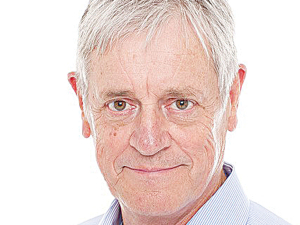Alliance commissions major heat pump system at Mataura, cutting coal use and emissions
Alliance Group has commissioned a new heat pump system at its Mataura processing plant in Southland.
 Doug Edmeades says the belief that methane has any practical effect on the earth’s temperature is false and therefore taxing methane is irrelevant.
Doug Edmeades says the belief that methane has any practical effect on the earth’s temperature is false and therefore taxing methane is irrelevant.
OPINION: According to Google, “A paradigm shift is a fundamental change in the basic concept and experimental practice of a scientific discipline”.
The realisation that Earth is not at the centre of our solar system was a paradigm shift; So too the understanding that the Earth was not flat. Things tick along for some time as “normal” and then something happens – a new discovery, for instance – and the whole way we look at things changes.
Our paradigm shifts.
I witnessed one of these moments the other day listening to an American physicist, Dr Tom Sheahen, talking in particular, about the greenhouse gas methane. His conclusion, based on recent fundamental research by Wijngaarden and Happer, was clear: When compared to the other GHGs i.e., water and carbon dioxide - methane is irrelevant!
Relative to the thinking behind He Waka eke Noa, which is based on IPCC models, this is a paradigm shift. The belief that methane has any practical effect on the earth’s temperature is false and therefore taxing methane is irrelevant.
Step back a little. The Earth absorbs and emits energy from the sun. In the absence of greenhouse gases (GHGs) the emitted energy would pass through the atmosphere out into space. But some of this energy is absorbed by the GHGs (water, carbon dioxide, methane and nitrous oxide) and then re-emitted in all directions – some coming back to Earth and warming it.
The net effect of this coming and going of energy is that the temperature of the Earth is about +15 degrees centigrade. Without these GHGs it would be about -18 degrees C. GHGs keep the Earth warm by ‘trapping’ some of the energy emitted by the Earth.
This emitted energy doesn’t come in ‘bulk’, but in certain defined frequencies – just like radio waves but on a grander scale. The frequency of the emitted energy depends in part on the physical-chemical properties of the individual gases. It just so happens that water “operates” across a broad spectrum of frequencies, whereas carbon dioxide and methane have very narrow bands, which are in fact overlapped, and to some extent masked, by the water spectrum.
The concentration of the four GHG gases in the atmosphere is also an important factor. Water ‘weighs in’ at about 15,000 ppm, carbon dioxide about 400 ppm and methane less than 2 ppm. Nitrous oxide is irrelevant at this scale. When the concentration of the GHGs is considered, together with the respective emission spectra, the calculations show that water dominates the scene and makes up about 85% of the GHG effect with carbon dioxide at about 15% and methane is irrelevant.
How come? How and why is this so different from the narrative that the IPCC and its followers, i.e. your government and its agencies, have been promulgating?
First up, the IPCC believes, based on their models, that water enhances the GHG effect of carbon dioxide, viz. an increase in carbon dioxide, resulting in an temperature increase that increases the amount of water in the atmosphere, which in turn enhances the warming.
We have heard this story ad nauseum recently as an explanation for the recent high intensity flooding events in New Zealand. This cannot be true because it would result in runaway global warming, which clearly has not occurred on Earth on a geological scale of time.
The IPCC models are problematic for another more telling reason. The calculations and hence conclusions regarding the effects of the various GHGs are based on an atmosphere which does not contain water! Not only is it missing the point about the important role of water, it is also the reason why it can glibly claim that methane is 28 times, and nitrous oxide 300 times, more potent than carbon dioxide.
With Wijngaarden and Happer’s proven model, we can at last do some numerical experiments. It turns out that increasing the current methane concentration will have a negligible practical effect on the Earth’s temperature.
Hence developing policies to limit methane emissions is a waste of money. So too, increasing the atmospheric carbon dioxide concentration from its current level will have negligible effect on temperature.
Who to believe? It is now accepted that the IPCC models over-estimate the current and projected temperature of the Earth by several degrees, relative to the observed temperatures coming from the satellites.
It is standard scientific practice to abandon, or modify, models if they are inconsistent with the empirical data. In the case of Wijngaarden and Happer the calculated emissions from the GHGs agree with the data coming from the satellites. QED.
Doug Edmeades spent 20 years as a MAF soil scientist at Ruakura and in 1997 established his own science consulting business agKnowledge.
Voting has started for the renewal of DairyNZ's milksolids levy.
The most successful catchment groups in NZ are those that have 'a source to sea' approach.
Associate Agriculture Minister and Manawatu dairy farmer Andrew Hoggard says the free trade agreement (FTA) negotiated with India is not a bad deal and his party, Act, will support it when it goes before Parliament.
Newly released data from Environment Canterbury (ECan) Farm Environment Plan (FEP) audits are showing a dramatic lift in environmental performance across the region.
A solid recovery of global dairy prices this year makes a $9.50/kgMS milk price almost a shoo-in for this season.
As New Zealand marks the United Nations’ International Year of the Woman Farmer 2026 (IYWF 2026), industry leaders are challenging the misconception that women only support farming.